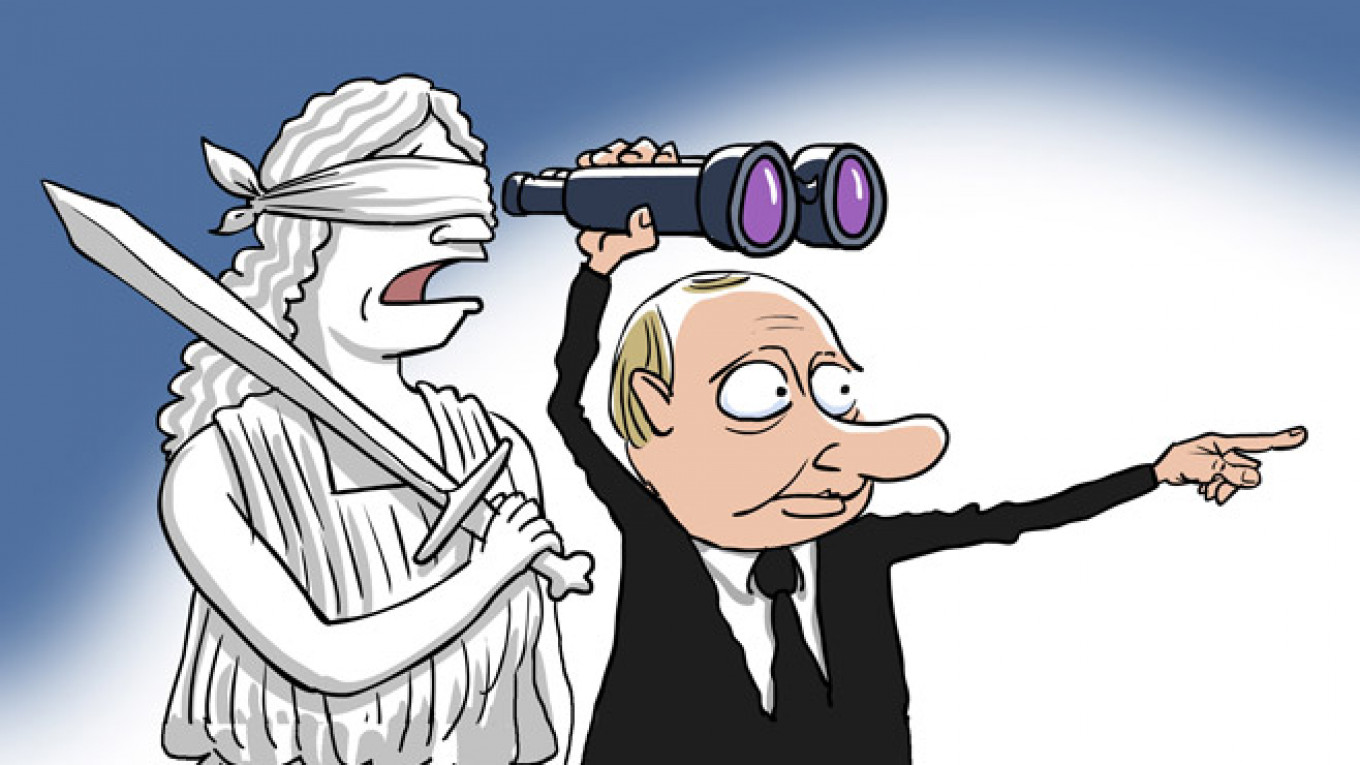The current fad for the Russian Investigative Committee to launch criminal investigations in cases outside Russia's borders — and often outside even tenuous Russian jurisdiction — may well come back to haunt the Kremlin. After all, at a time when the question of "sovereignty" is so central to its foreign and domestic policies, does Moscow really want to encourage the "internationalization" of justice?
As already reported in The Moscow Times, it has most recently opened the case of the desecration of World War II monuments in Ukraine as a breach of Russian laws on vandalism and rehabilitating Nazism.
Obviously, vandalism is a crime and painting pro-Nazi graffiti is especially unpleasant. However, to present this as something meeting the requirements for international investigations, on a par with crimes against humanity, is a reach of tremendous proportions.
There is the danger of crying wolf. The outside world tends to regard these claims as nothing more than propaganda and "lawfare," the weaponization of the machinery of justice for narrow national ends.
I have heard Western justice and police officials describe the Investigative Committee as nothing more than an arm of informational warfare and political persecution. This is, in my opinion, a caricature of an agency also involved in real and serious policing work.
However, if this kind of perspective takes hold, then when the committee is following a real case and looking for Western cooperation, that may not be forthcoming, as it will be assumed that this must simply be a political investigation.
Second, the hyperbole of Russian rhetoric is making it very hard for the West to be able to address or even discuss the extent to which ultranationalism is a rising force in Ukraine. Of course, Moscow's propaganda overstates this by orders of magnitude, but it is not entirely invented.
However, in the current overheated and polarized environment, just as questioning the Kremlin's narrative risks getting someone characterized as some kind of fascist sympathizer in Moscow, so too someone raising the problem of the rise of the far right in Ukraine in the West can all too easily be dismissed as being a dupe or tool of Moscow's.
And a parenthetical note: If Kiev wants seriously to launch an information counteroffensive, it could do worse than put some serious effort into confronting the current rise in neo-Nazism. These people may be just a small, stupid and offensive minority, but their antics play disproportionately into the hands of Ukraine's enemies.
Third, the Kremlin needs to think deeply how far it wants to allow the Investigative Committee to undermine the concept of legal sovereignty. Next time some Russian politician makes a racist slur against U.S. President Barack Obama, how comfortable would Moscow be if a race crime investigation were opened by the FBI? Next time there are allegations of a Russian company's involvement in corrupt practices, would the Kremlin be happy with an inquiry by the British fraud squad?
Of course, no such investigations would get anywhere, not least because of Russia's constitutional bar on extraditing its own citizens. But that is hardly the point: the chances the Investigative Committee's current inquiries in Ukraine will go beyond a press release and some overheated press articles are equally minimal.
Rather, it is the principle that the bar for international justice should be lowered far enough to include vandalism that could become a weapon for the Kremlin's foes.
Putin has long championed Russia's sovereignty, although the nuances to the way he uses this are significantly different to the West's. Just as his "sovereign democracy" meant a rather different beast to the form dominant in the West, so too his championing of national sovereignty carries with it a clear sense of national priority.
The West often may not practice this (just ask the Afghans, Iraqis or Libyans), but it preaches the option that sovereignty is equal. In other words, the national sovereignty of the small and the weak is just as valid and important as that of the large and the strong.
Putin's notion of sovereignty clearly assumes that some powers deserve a privileged place, including Russia in Eurasia. Indeed, he probably would have no trouble conceding Central America to Washington or North Africa to the Europeans, if only they would recognize Moscow's special status in Eurasia.
For all kinds of reasons, this is not going to happen. However, the more Putin, or at least his people, seem to be suggesting that sovereignty is a negotiable value, something that only counts if it can be asserted and protected, the more it is implicitly undermining its own security.
After all, if it is acceptable for one country to try and enforce its values on another, presumably this means that all those Western programs aimed at promoting democracy, questioning media and creating anti-corruption initiatives in Russia — programs the Kremlin not wholly unreasonably regards as instruments of "soft regime change" — are also acceptable?
Mark Galeotti is professor of global affairs at New York University.
A Message from The Moscow Times:
Dear readers,
We are facing unprecedented challenges. Russia's Prosecutor General's Office has designated The Moscow Times as an "undesirable" organization, criminalizing our work and putting our staff at risk of prosecution. This follows our earlier unjust labeling as a "foreign agent."
These actions are direct attempts to silence independent journalism in Russia. The authorities claim our work "discredits the decisions of the Russian leadership." We see things differently: we strive to provide accurate, unbiased reporting on Russia.
We, the journalists of The Moscow Times, refuse to be silenced. But to continue our work, we need your help.
Your support, no matter how small, makes a world of difference. If you can, please support us monthly starting from just $2. It's quick to set up, and every contribution makes a significant impact.
By supporting The Moscow Times, you're defending open, independent journalism in the face of repression. Thank you for standing with us.
Remind me later.


